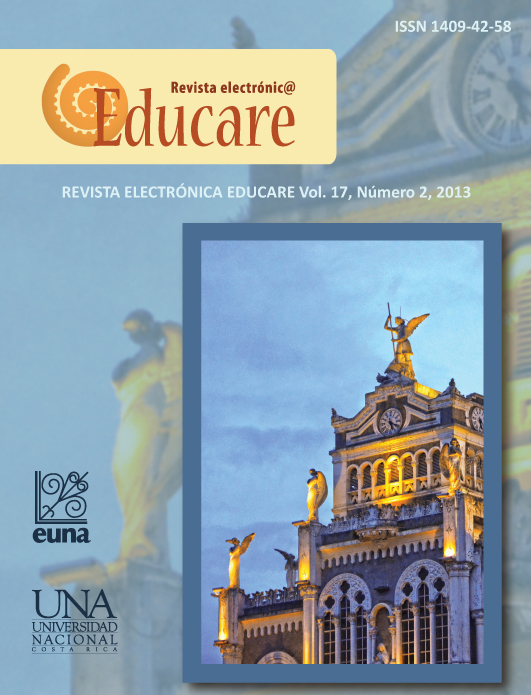In the Footsteps of Food Left by Our Ancestors: “Sowing the Past, Cultivating the Present in Harmony with Mother Earth”
DOI:
https://doi.org/10.15359/ree.17-2.5Keywords:
Boruca indigenous community, food security, productive reconversion, ative food, Educare Electronic Journal, Costa RicaAbstract
Indigenous peoples have experienced food shortages in recent years. The rapid destruction of natural resources, lack of incentives for producers, globalization and free tradeagreements havec caused an uprooting from the land in the native mind. Moreover, it has been difficult to establish an adequate relationship between traditional farming practices and technical advice to put the community economy on the right track with new ways to strengthen the knowledge inherited from our grandparents on the cultivation and consumption of agricultural products, in harmony with nature. This reality, which affects the Boruca indigenous region, has led to economic, social and cultural problems, coupled with an evident threat: loss of food sovereignty.
References
Aguilar, M. E., Angulo, L., Cerdas, Y., Céspedes, E., Monge, M. E., Ovares, S., Solano, J. y van
Kampen, P. (2003). Un acercamiento a la educación general básica de las zonas rurales de seis
países centroamericanos. Un estudio exploratorio. Heredia: EFUNA.
Amador, J. L. (2008). Historia y tradición en Potrero Grande. Un pueblo costarricense de origen
chiricano-panameño. San José, Costa Rica: EUNED.
Castro, O. O. (2007). Autogestión de las organizaciones locales. Una herramienta para el desarrollo
comunitario. Comayagua, Honduras: Universidad Nacional.
Instituto de Estudios de las Tradiciones Sagradas de Abia Yala (IETSAY). (2001). Narraciones
bruncas: Boruca y curré. San José, Costa Rica. Fundación coordinadora de pastoral aborigen.
Lanzas, M. S. (3 de mayo de 2012). Arroceros preparan marcha. Diario Extra. Recuperado de http://
anteriores.diarioextra.com/2012/mayo/03/nacionales0.php
Downloads
Published
How to Cite
Issue
Section
License
1. In case the submitted paper is accepted for publication, the author(s) FREELY, COSTLESS, EXCLUSIVELY AND FOR AN INDEFINITE TERM transfer copyrights and patrimonial rights to Universidad Nacional (UNA, Costa Rica). For more details check the Originality Statement and Copyright Transfer Agreement
2. REUTILIZATION RIGHTS: UNA authorizes authors to use, for any purpose (among them selfarchiving or autoarchiving) and to publish in the Internet in any electronic site, the paper´'s final version, both approved and published (post print), as long as it is done with a non commercial purpose, does not generate derivates without previous consentment and recognizes both publisher's name and authorship.
3. The submission and possible publication of the paper in the Educare Electronic Journal is ruled by the Journal’s editorial policies, the institutional rules of Universidad Nacional and the laws of the Republic of Costa Rica. Additionally, any possible difference of opinion or future dispute shall be settled in accordance with the mechanisms of Alternative Dispute Resolution and the Costa Rican Jurisdiction.
4. In all cases, it is understood that the opinions issued are those of the authors and do not necessarily reflect the position and opinion of Educare, CIDE or Universidad Nacional, Costa Rica. It is also understood that, in the exercise of academic freedom, the authors have carried out a rogorous scientific-academic process of research, reflection and argumentation thar lays within the thematic scope of interest of the Journal.
5. The papers published by Educare Electronic Journal use a Creative Commons License:














 The articles published by Educare Electronic Journal can be shared with a Creative Commons License:
The articles published by Educare Electronic Journal can be shared with a Creative Commons License: 



